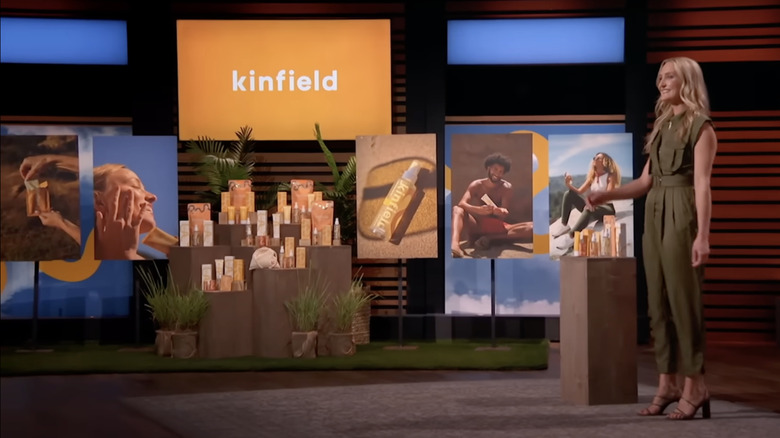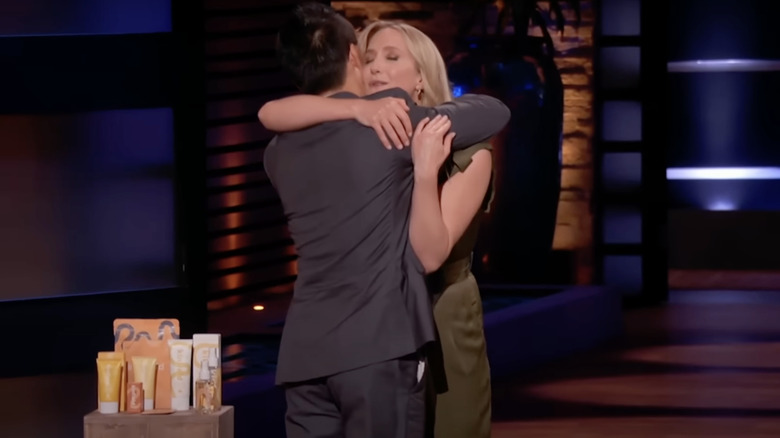What Happened To Kinfield After Shark Tank?
Nichole Powell stood in front of the row of ultra-wealthy and influential sharks on "Shark Tank" Season 14, Episode 11 pitching Kinfield, her plant-based skincare product to protect people from bugs outdoors. Powell wanted an alternative to the artificial, environmentally unfriendly, and uncomfortable bug sprays she grew up using in Minnesota. Powell's vision for Kinfield is "clean bug spray that works."
Kinfield's first product was called "Golden Hour," a bug repellent made with citronella, lemon grass, and vanilla, while also being DEET-free, a chemical that, in some cases, can cause irritation, redness, rashes, and swelling. The company also went on to expand and sell a biodegradable repellent wipe, recovery products, and a line of mineral sunscreens.
Powell entered seeking $250,000 for 5% equity in Kinfield. The first person to make a remark on the product was Barbara Corcoran, who complimented the smell of the product and how it didn't smell like bug repellent. Next to comment was guest shark and CEO of DoorDash Tony Xhu, who asked about how Kinfield's products compared to DEET-infused products. Powell explained the product had been lab-tested and that Kinfield's bug repellent had a three-hour protection time. Lori Grenier then asked how Powell came up with the idea and Powell explained that she discovered an alternative method of bug repellent while in Indonesia. Following these answers, the shark's interests were peaked.
What were the offers?
"Mr. Wonderful" Kevin O'Leary determined Nichole Powell was valuing her Kinfield business at $5 million and wanted to know how she came to that number. Powell went into detail about how she launched the company in summer 2019 and brought in $5,000 in sales. In 2020, she did $187,000 in sales, in 2021, she did $565,000, and halfway through 2022 (the year of the episode's filming), she'd already hit the $1.5 million mark, putting her on track to finish the year at $2.1 million in sales. Powell stated the business had not yet become profitable, but was projected to be in a year and a half. Mark Cuban was concerned after hearing that and decided to back out of making an offer, causing Kinfield to lose the shark with the highest net worth.
After processing the information on Kinfield's products and financials, Barbara Corcoran offered Powell $250,000 for 10% equity, as well as a $2 royalty per product fee until she was reimbursed. O'Leary then took the opportunity to jump in with an offer for $250,000 for 5% equity, plus a $1.50 royalty until he was reimbursed $750,000. Lori Greiner offered $250,000 for 5% with a $4 royalty per unit until she was reimbursed. She also brought up her success with the Season 11 "Shark Tank" product Bug Bite Thing, which brought in more than $25 million in sales in two years and can now be found in 30,000 stores.
Guest shark Tony Xhu then added another offer into the mix because he believed the product would generate a significant return on investment down the line. He offered $250,000 for 10% with no royalty. Corcoran offered to match it, so Powell asked if Corcoran and Xhu would contribute $125,000 each for a 5% stake. Grenier subsequently pulled her offer, so Xhu and Corcoran teamed up to seal the deal Powell suggested.
How is Kinfield doing today?
It's not often four out of five sharks make an offer on a product or service, but Nichole Powell's Kinfield skincare line was one of the few exception. Kinfield was already off to a good start in that respect. After all, "Shark Tank" doesn't pay people who make pitches on the show, but the exposure is certainly lucrative.
The deal Powell worked out with Barbra Corcoran and Tony Xhu also apparently closed successfully, as Powell posted a video on her Instagram recapping landing the deal, and on the Kinfield website, the company sells a "Shark Tank Bundle" featuring the products featured on the show.
Kinfield has also gone on to expand its product line to now feature a lip balm, deodorant, hydrating face masks, anti-itch products, and an anti-chafe balm. Powell's estimation of the business's revenue only going up has also proven to be true, as well, with the company having an estimated annual revenue of $4 million per year as of June 2024, according to Shark Tank Blog.

